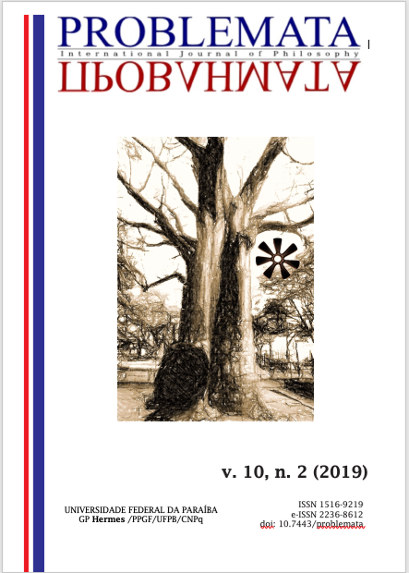GENOCIDE OF THE BLACK PEOPLE AND BIOETHIC:
AN ANTHROPOLOGICAL ISSUE
DOI:
https://doi.org/10.7443/problemata.v10i2.49116Keywords:
Anthropology, Colonialism, Genocide, Freedom, SurvivalAbstract
This scientific article addresses the affliction provoked by the necropolitics that currently decimates black people of Brazil, with a murder rate of 75% of the country’s total count. This reflection reverberates the shooting of Evaldo Rosa, in abril 7th, 2019, whose car was hit by 62 of 257 shots fired by army’s military, in the city of Rio de Janeiro and unleashed a wave of complaints against the genocide of black people perpetrated by the Brazilian state. A disarmed black man that was driving his own family, the fatal victim was also target of derision by his murderers. The article’s reasoning brings up literature’s excerpts produced by the Martinican psychiatrist Frantz Fanon (1925-1961), whose work is engaged on the anticolonial fight in support of a free Africa. Likewise, the text also discusses the United-Statian Van Rensselaer Potter (1911-2001), a biochemist, oncological researcher, considered one of the founders of Bioethics. The article compares the anthropological assumptions of each author. In Fanon, the confrontation of colonialism of the 1950 and 1960 and its repercussions on societies and on people’s psyche consists of the raw material of his activities as a psychiatrist, writer and political activist. Potter, sensitized by his teaching and his experience with cancer patients, evaluated the conditions of human survival on the planet and envisioned the need for cultural changes under penalty of life extinction. Fanon’s uneasiness about freedom, in his analysis of colonialism and the liberation struggle, considered the need for violence and death; Potter, motivated by survival, postulated a quantitative control of the population. Given this scenario, the present reflection wants to know: in what sense the relationship between the genocide of black people, in Brazil, and bioethics establish an anthropological question? Regarding this questioning, the article recovers the subject of philosophical anthropology, weaving a general profile of the discipline as well as its importance for human action. Moreover, the article collects from Fanon's writings approaches that may identify his anthropological perspective. Furthermore, it does the same process regarding Potter’s writings. In conclusion, Fanon’s anthropological reflections lay in consciousness and the growing of awareness, liberty’s preconditions and responsibility. In contrast, Potter articulates a discriminatory humanism, a premise with serious repercussions.
Downloads
References
CARMO, Raymundo Evangelista do. Antropologia Filosófica Geral. 2.ed. Belo Horizonte, MG: Lutador, 1975.
FANON, Frantz. Pele negra, máscaras brancas. Porto: Paisagem, 1975.
______. Sociología de una revolución. 3. ed. Traducción de Víctor Flores. México 13, D.F.: Ediciones Era, 1976.
______. Os condenados da terra. 2. ed. Tradução de José Laurênio de Mello. Rio de Janeiro: Civilização Brasileira, 1979.
______. Em defesa da revolução africana. Lisboa: Livraria Sá da Costa Editora, 1980.
______. L’An V de la révolution algérienne. Paris: La Découverte, 2001. ([Re]découverte. Documents et témoinagnes).
______. Pele Negra Máscaras Brancas. Tradução de Renato da Silveira. Salva-dor: EDUFBA, 2008.
HORKHEIMER, Max; ADORNO, Theodor. Dialética do esclarecimento: fragmentos filosóficos. Tradução de Guido Antonio de Almeida. Rio de Janeiro: Jorge Zahar, 1985.
IPEA. Atlas da violência 2019. Organizadores: Instituto de Pesquisa Econômica Aplicada; Fórum Brasileiro de Segurança Pública. Brasília: Rio de Janeiro: São Paulo: Instituto de Pesquisa Econômica Aplicada; Fórum Brasileiro de Segurança Pública. Disponível em: http://www.ipea.gov.br/portal/images/stories/PDFs/relatorio_institucional/190605_atlas_da_violencia_2019.pdf. Acesso em 15set 2019.
JAPIASSU, Hilton; MARCONDES, Danilo. Dicionário básico de Filosofia. 3.ed. revista e ampliada. Rio de Janeiro: Jorge Zahar, 2001. Disponível em: http://raycydio.yolasite.com/resources/dicionario_de_filosofia_japiassu.pdf. Acesso em 08set2019.
MONDIN, Battista. O homem: quem é ele? Elementos de antropologia filosófica. 7.ed. Tradução de R. Leal Ferreira e M.A.S. Ferrari. Revisão de Danilo Morales. São Paulo: Paulinas, 1980.
ONDÓ, Eugene Nkogo. Síntesis sistemática de la filosofia africana. Barcelona, Esp: Ediciones Carena, 2006.
PESSINI, Leo; SGANZERLA, Anor; ZANELLA, Diego Carlos (orgs.). Van Rensselaer Potter: um bioeticista original. São Paulo: Loyola, 2018.
POTTER, Van Rensselaer. Bioética: ponte para o future. Tradução Diego Carlos Zanella. São Paulo: Loyola, 2016.
POTTER, Van Rensselaer. Bioética global: construindo a partir do legado de Leopold / Van Rensselaer Potter. Tradução de Cecília Camargo Bartalotti. São Paulo: Loyola, 2018.
SALLES, Fernando Ricardo. A relevância da cibernética: aspectos da contribuição filosófica de Norbert Wiener. Disponível em: http://filosofia.fflch.usp.br/sites/filosofia.fflch.usp.br/files/posgraduacao/defesas/2007_mes/MES_2007_FernandoSalles.pdf. Dissertação de Mestrado em Filosofia – Faculdade de Filosofia, Letras e Ciências Humanas, Universidade de São Paulo. São Paulo, p. 1, 2007. Acesso em 08set2019.
TOSQUELLES, Francesc. Frantz Fanon en Saint-Alban (1975). Disponível em: Teoría y Crítica de la Psicología 9 (2017), 223-229. http://www.teocripsi.com/ojs/ (ISSN: 2116-3480). Acesso em 10set2019.
VAZ, Henrique Cláudio de Lima. Antropologia filosófica I. 3.ed. corrigida. São Paulo: Loyola, 1991.
YASBEK, Mustafa. A revolução argelina. São Paulo: Ed. UNESP, 2010.
https://brasil.estadao.com.br/noticias/geral,75-das-vitimas-de-homicidio-no-pais-sao-negras-aponta-atlas-da-violencia,70002856665// https://brasil.estadao.com.br/noticias/geral,75-das-vitimas-de-homicidio-no-pais-sao-negras-aponta-atlas-da-violencia,70002856665
Downloads
Published
Issue
Section
License
Authors who publish with this journal agree to the following terms:
- Authors retain copyright and grant the journal right of first publication with the work simultaneously licensed under a Creative Commons Attribution License that allows others to share the work with an acknowledgement of the work's authorship and initial publication in this journal.
- Authors are able to enter into separate, additional contractual arrangements for the non-exclusive distribution of the journal's published version of the work (e.g., post it to an institutional repository or publish it in a book), with an acknowledgement of its initial publication in this journal.
-
- Authors are permitted and encouraged to post their work online (e.g., in institutional repositories or on their website) prior to and during the submission process, as it can lead to productive exchanges, as well as earlier and greater citation of published work (See The Effect of Open Access).





